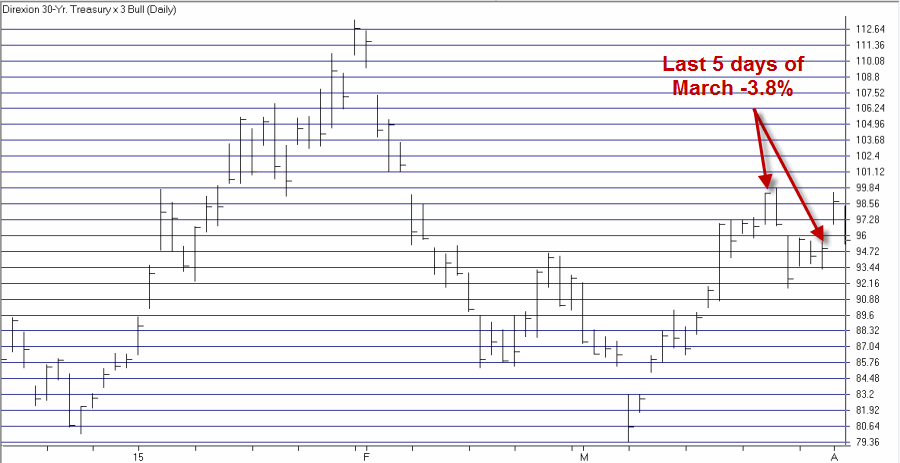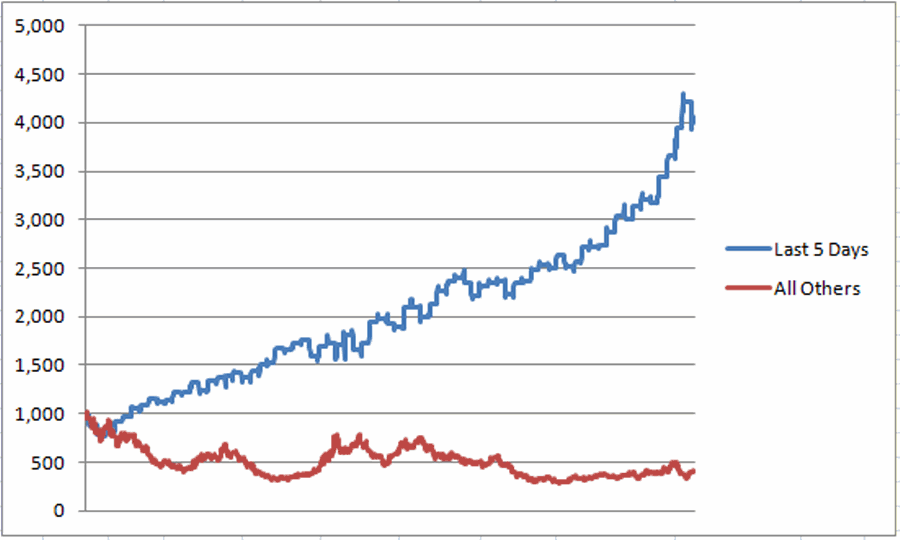I hate to sound paranoid but, boy, Murphy sure hates me. last month I wrote an article titled “A Risky (but Darned Exciting) Strategy for T-Bond Traders.” The simple idea detailed in the article is based on the fact that over the years t-bonds have gained a lot of ground during the last 5 trading days of the month and lost a lot of ground during all other trading days of the month. I then detailed a strategy that simply involved buying a triple-leveraged t-bond ETF and holding it during the last five trading days of each month.
The historical numbers look great. The numbers for March 2015, on the other hand – not so much.
As you can see in Figure 1, ticker (NYSE:TMF) cratered big time during the last five trading days of March 2015 and this 5-day period witnessed a decline of -3.8%. Like I said, Murphy hates me.
The Upshot
So what is the moral of the story here? Well, in reality I don’t think there necessarily is one. Although for the record please note the verbose use of the word “Risky” right in the very title of the original article. Still, what happens during any one five day period in the financial markets is not really indicative of anything (other than the aforementioned incontrovertible fact that Murphy undeniably loathes my very existence. But I digress).
From the perspective of a trader considering the relative merits of a potential trading method (i.e., buying and holding a triple leveraged bond ETF during the last five trading days of every month):
- It is OK to say “I don’t really understand why this has worked in the past and I don’t know if it will work in the future, therefore I will choose not to use it.”
- It is OK to say “this looks like a very volatile approach to trading with potentially large swings in equity, therefore I will choose not to use it.”
- It is OK to say “short-term trading is not my thing, therefore I will choose not to use it.”
On the other hand:
- It IS NOT OK to say “well the darn didn’t work this month so obviously it is a stupid idea that I will discard without ever looking back and I don’t blame Murphy for hating the author’s guts.”
Like I said, what happens over the course of one “period” – whether very good, very bad , or somewhere in between – can be instructive in terms of illustrating the risks involved, however, it tells you nothing about the long-term prospects. A close look at Figure 2 reveals that even this latest month’s “debacle” in no way negates the overall long-term trend. In fact, for the record, the “system” is still up +8.1% for 2015.
Growth of $1,000 holding TMF last five trading days of month versus all other trading days; April 2009 to present.
Summary
Contrary to what many may tell you, there is nothing wrong with devoting trading capital to “risky” strategies. In fact, they can turn out to be the thing that separates your own overall long-term performance from everyone else’s. However, the keys are to:
1) Hold a reasonable level of confidence that it will be successful over time.
2) Devote and risk only a small portion of your trading capital to such strategies.
3) Go into these types of strategies with your eyes wide open and mentally prepared for periods like, well, March 2015 in t-bonds using a triple leveraged ETF.
Jay’s Trading Maxim #105: Don’t let any strategy put stars (or dollar signs) in your eyes. If you are walking down the street and you trip and fall that is one thing. If you are standing on a mountain top looking at the stars and you trip and fall that is something entirely different.

